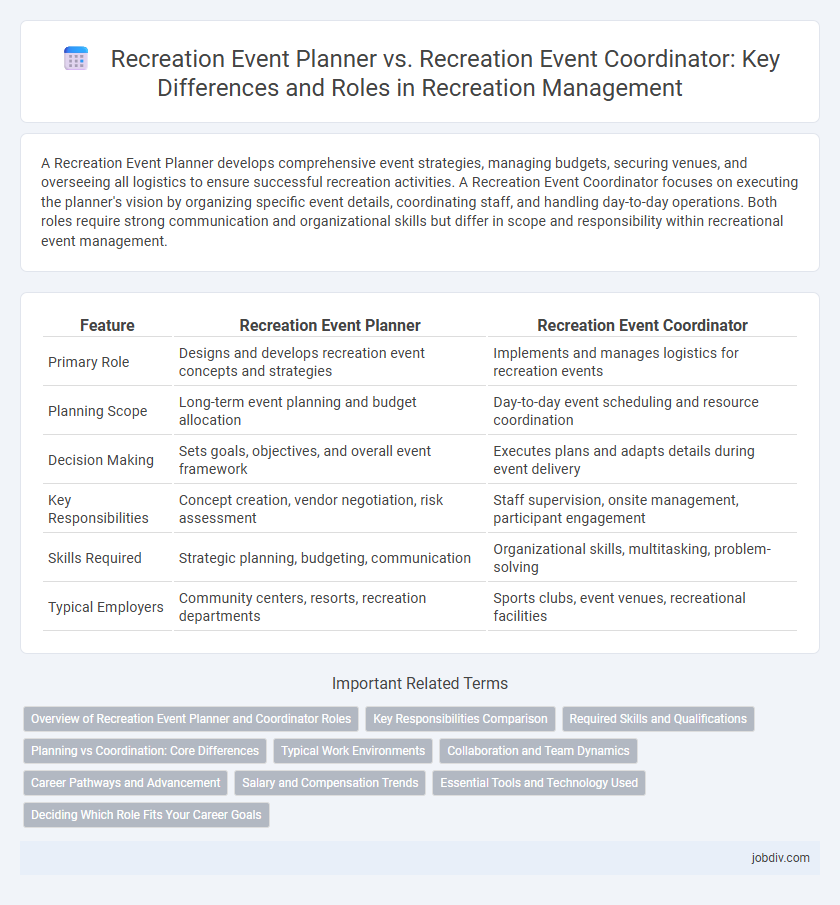A Recreation Event Planner develops comprehensive event strategies, managing budgets, securing venues, and overseeing all logistics to ensure successful recreation activities. A Recreation Event Coordinator focuses on executing the planner's vision by organizing specific event details, coordinating staff, and handling day-to-day operations. Both roles require strong communication and organizational skills but differ in scope and responsibility within recreational event management.
Table of Comparison
| Feature | Recreation Event Planner | Recreation Event Coordinator |
|---|---|---|
| Primary Role | Designs and develops recreation event concepts and strategies | Implements and manages logistics for recreation events |
| Planning Scope | Long-term event planning and budget allocation | Day-to-day event scheduling and resource coordination |
| Decision Making | Sets goals, objectives, and overall event framework | Executes plans and adapts details during event delivery |
| Key Responsibilities | Concept creation, vendor negotiation, risk assessment | Staff supervision, onsite management, participant engagement |
| Skills Required | Strategic planning, budgeting, communication | Organizational skills, multitasking, problem-solving |
| Typical Employers | Community centers, resorts, recreation departments | Sports clubs, event venues, recreational facilities |
Overview of Recreation Event Planner and Coordinator Roles
Recreation Event Planners develop comprehensive strategies for community activities, managing budgets, selecting venues, and coordinating with vendors to ensure successful event execution. Recreation Event Coordinators handle the logistical aspects, such as scheduling, volunteer management, and on-site support, facilitating smooth event operations. Both roles require strong organizational skills and a deep understanding of recreational programming to enhance participant engagement and satisfaction.
Key Responsibilities Comparison
A Recreation Event Planner primarily focuses on designing and developing event concepts, budgeting, and securing venues, ensuring all logistical details align with client goals. In contrast, a Recreation Event Coordinator manages on-the-ground execution, coordinating vendors, staff, and schedules to guarantee smooth event operation. Both roles require strong organizational skills, but planners emphasize strategic planning while coordinators handle real-time problem-solving and operational oversight.
Required Skills and Qualifications
Recreation Event Planners typically require advanced project management skills, budgeting expertise, and experience in strategic event design to successfully organize large-scale recreational activities. Recreation Event Coordinators need strong interpersonal skills, attention to detail, and proficiency in scheduling and resource allocation to manage event logistics effectively. Both roles benefit from certifications in event planning, knowledge of safety regulations, and the ability to work collaboratively with vendors and community stakeholders.
Planning vs Coordination: Core Differences
A Recreation Event Planner focuses on designing the overall event strategy, including budget allocation, venue selection, and program development to ensure a successful recreational experience. In contrast, a Recreation Event Coordinator manages the logistical execution, such as scheduling, vendor communication, and on-site problem-solving during the event. The core difference lies in the Planner's emphasis on pre-event preparation and strategic planning, while the Coordinator handles real-time coordination and operational tasks.
Typical Work Environments
Recreation Event Planners typically work in diverse settings such as community centers, resorts, and large event venues, managing the overall event strategy and logistics. Recreation Event Coordinators often operate within more specific environments like local parks, recreation departments, or schools, focusing on day-to-day event execution and participant engagement. Both roles require adaptability to fast-paced, dynamic settings that prioritize public interaction and entertainment.
Collaboration and Team Dynamics
Recreation event planners oversee the strategic collaboration and coordination of resources, ensuring cohesive teamwork among vendors, participants, and staff to achieve event goals efficiently. Recreation event coordinators facilitate daily operational tasks and foster strong communication channels within the team to maintain smooth event execution and address real-time challenges. Both roles require effective interpersonal skills to promote synergy, enhance team dynamics, and deliver successful recreational experiences.
Career Pathways and Advancement
Recreation event planners typically oversee the strategic planning, budgeting, and coordination of large-scale recreational activities, positioning themselves for advancement into senior management or director roles within community recreation departments or private event firms. Recreation event coordinators focus on the logistical execution, vendor management, and on-site operations, gaining specialized skills that often lead to supervisory positions or specialized roles in event marketing and client relations. Career pathways in both roles emphasize project management expertise and stakeholder communication, with advancement opportunities available through certification programs such as Certified Meeting Professional (CMP) or Certified Special Events Professional (CSEP).
Salary and Compensation Trends
Recreation Event Planners typically command higher salaries than Recreation Event Coordinators due to their strategic responsibilities and project oversight, with median annual earnings ranging from $55,000 to $75,000 compared to $40,000 to $55,000 for coordinators. Compensation trends indicate that planners receive more comprehensive benefits packages, often including performance bonuses and health insurance, reflecting their leadership roles in organizing large-scale recreational events. Job market demand for both positions is growing, but planners benefit from stronger salary growth potential driven by increased event complexity and stakeholder engagement.
Essential Tools and Technology Used
Recreation event planners leverage advanced project management software and data analytics tools to design, budget, and execute large-scale events efficiently, ensuring resource allocation aligns with participant engagement metrics. Recreation event coordinators primarily use scheduling applications and communication platforms to manage on-site logistics, coordinate staff, and facilitate real-time problem-solving for smooth event operation. Both roles rely on event registration systems and customer relationship management (CRM) software to optimize attendee experience and streamline event workflows.
Deciding Which Role Fits Your Career Goals
Choosing between a Recreation Event Planner and a Recreation Event Coordinator depends on your career aspirations and skill set. Recreation Event Planners typically focus on the strategic aspects, including budgeting, marketing, and overall event design, aligning with long-term career growth in management or specialized event development. In contrast, Recreation Event Coordinators emphasize executing event logistics, managing on-site operations, and ensuring smooth event delivery, making this role ideal for those who excel in hands-on management and real-time problem-solving.
Recreation Event Planner vs Recreation Event Coordinator Infographic

 jobdiv.com
jobdiv.com